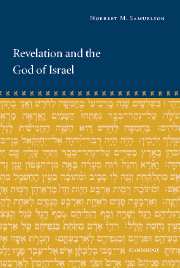Book contents
- Frontmatter
- Contents
- Acknowledgments
- Introduction
- PART I THE GOD OF REVELATION
- PART II IS THE GOD OF REVELATION BELIEVABLE?
- 5 The challenges of political ethics – issues of racism and the irrational
- 6 The challenges of modern science
- 7 The challenges of modern philosophy – rethinking God
- 8 Are the Hebrew Scriptures revealed?
- Conclusion
- Works cited
- Index of names
- Index of subjects
8 - Are the Hebrew Scriptures revealed?
Published online by Cambridge University Press: 22 September 2009
- Frontmatter
- Contents
- Acknowledgments
- Introduction
- PART I THE GOD OF REVELATION
- PART II IS THE GOD OF REVELATION BELIEVABLE?
- 5 The challenges of political ethics – issues of racism and the irrational
- 6 The challenges of modern science
- 7 The challenges of modern philosophy – rethinking God
- 8 Are the Hebrew Scriptures revealed?
- Conclusion
- Works cited
- Index of names
- Index of subjects
Summary
REVIEW
In the first part of this book I developed a conception of revelation as a relationship between God and the people Israel out of which arises a form of content-information (i.e., of communication) called “Torah.” This view was developed out of Jewish sources, namely, the Hebrew Scriptures, classical Jewish philosophy, and modern Jewish theology. Several individual voices were involved in forming this conception, but the dominant ones were those of Maimonides in philosophy and Rosenzweig in theology.
The second part of the book has been an examination of how believable this conception of revelation is. With this chapter that discussion will be concluded. Here I have been looking at sources of authority outside Judaism in order to see if they raise issues that can undermine a reasonable belief in the doctrine of revelation as here presented. Those sources have been both philosophical and scientific.
In chapter 5 I considered philosophical issues from contemporary ethics that forced me to reformulate what I took from Rosenzweig as a general concept of revelation. I had to remove the implicit racism in the conception of Israel that he absorbed from Jewish philosophy, primarily from Judah Halevi, and I had to disavow the irrationalism in his conception of religious belief that he accepted from his European romantic literary tradition. Jews may be born Jews, but the Jewish people are chosen, not because of their blood but because of their Torah.
- Type
- Chapter
- Information
- Revelation and the God of Israel , pp. 221 - 235Publisher: Cambridge University PressPrint publication year: 2002



